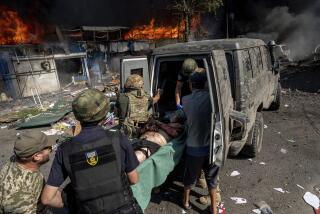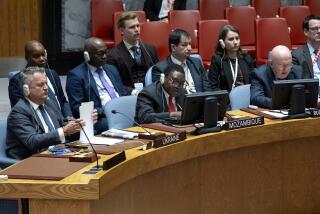U.N. to Probe Rights Abuses in Bosnia : Balkans: A former Polish prime minister is picked to head the investigation.
- Share via
GENEVA — The United Nations Human Rights Commission on Friday unanimously approved a U.S. proposal condemning the practice of “ethnic cleansing” in Bosnia-Herzegovina and calling for a special investigation into human rights abuses in that former Yugoslav republic.
Former Polish Prime Minister Tadeusz Mazowiecki, 63, a journalist who won international recognition for his key role in the Solidarity movement, was nominated to head the investigation and report back to the U.N. Security Council by Aug. 28.
Unanimous acceptance of the U.S.-sponsored resolution, on the final day of a two-day meeting, was a victory for the American team headed by Assistant Secretary of State John R. Bolton, assigned by the Bush Administration to open another front in the international diplomatic campaign to halt the chaotic violence in the Balkans.
Going into the emergency meeting, the United States faced strong opposition from Arab and Muslim members who wanted specific condemnation of Serbia as the aggressor in the conflict, which has cost the lives of thousands of people and left as many as 2 million homeless.
“We would have preferred to name the aggressors and victims by name,” said Turkish Ambassador Gunduz Aktan. “For us, what is going on in Bosnia-Herzegovina is not a civil war but a foreign aggression by the regime in Belgrade.”
The final document approved by the 53 members of the Human Rights Commission does not specifically mention Serbia nor the ethnic Serbs. It calls for a special envoy to “investigate firsthand the human rights situation in the territory of the former Yugoslavia, in particular within Bosnia-Herzegovina, and to receive relevant, credible information on the human rights situation there from governments, individuals, intergovernmental and non-governmental organizations.”
After conferring with predominantly Muslim countries such as Iran and Libya, Bolton added to the resolution a section that condemns mistreatment of the region’s Muslims.
Serbian Ambassador Branko Brankovic--whose republic is allied with Montenegro in what is left of the splintered Yugoslav federation--criticized the document as a form of “racial discrimination in a war in which everyone is shooting.” But Brankovic, who on Thursday traded charges of “fascism” with American delegate Bolton, said Serbia will permit the visit of the special investigator named by the commission.
In nominating Mazowiecki, a Polish intellectual who was jailed for two years beginning in 1981 after joining with striking Solidarity workers in the Gdansk shipyards, the commission chose a widely respected East European with impeccable credentials.
Mazowiecki became the first post-Communist prime minister of Poland in 1989. After serving until December, 1990, he was defeated in a campaign for the Polish presidency. Since then, he has headed the Democratic Union party.
In attempting to sort out and name villains in the complicated conflict among Serbia-Montenegro and the now-independent republics of Bosnia-Herzegovina and Croatia, Mazowiecki faces a daunting challenge with a severe deadline. Sponsors of the human rights resolution want him to compile a report in time for an Aug. 26-28 conference on the Balkans in London.
But before Mazowiecki can begin his investigation, his nomination must first be approved by the U.N. Economic and Social Council in New York.
Bolton said he hopes that U.N. confirmation will take place Monday and that Mazowiecki can be on the road to Sarajevo, the Bosnian capital, that same day.
“This is an urgent human rights situation that cannot wait,” Bolton said.
In Washington, meanwhile, wire services quoted the White House as denying a published report that U.S. intelligence agencies as early as June had uncovered widespread atrocities by Serbian forces in Bosnia, including summary executions and beatings that led to thousands of deaths.
New York Newsday said Friday that the Bush Administration has withheld details of its intelligence findings, portraying the reports as anecdotal or inconclusive and contending that they often did not go beyond press reports from the region.
But the newspaper said the information was in fact gathered through a comprehensive intelligence-gathering operation ordered by President Bush in May and including the CIA and the Defense Intelligence Agency.
“We didn’t have any knowledge different than what everybody else had as well,” White House spokesman Marlin Fitzwater said Friday.
In New York, an American captured by Serbs while fighting for Croatia’s independence said Thursday that he was beaten and threatened with death if he complained to the Red Cross about mistreatment, the Associated Press reported.
“There are things that I witnessed that I would not like done to my worst enemy,” said Marin Pesa, 21.
Pesa, whose parents immigrated from Croatia to New York City, left to fight for Croatia in February. He was captured in March by Serbian soldiers, and the State Department confirmed that he was a prisoner in camps in Bosnia, Montenegro and Serbia over a five-month period.
More to Read
Sign up for Essential California
The most important California stories and recommendations in your inbox every morning.
You may occasionally receive promotional content from the Los Angeles Times.













